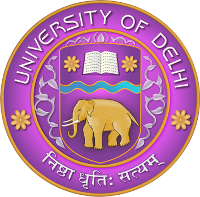
The University of Delhi was established in 1922, and some of its colleges are even older. Over this period, it has made an enormous contribution to higher education. From the beginning, a strong commitment to excellence in teaching and research has made it a role model and path-setter for universities in India.
The University of Delhi is the largest university in India with nearly 230,000 regular students, 400,000 students in distance learning mode and about 10,000 teachers. There are 90 Colleges, 16 Faculties, 86 Departments, 23 Centres and 3 Institutes. It offers 540 programmes, which include Undergraduate, Masters, M.Phil., Ph.D., Certificate and Diploma programmes.
The university departments are in the two campuses: North and South. The main (North) campus concentrates on basic disciplines such as arts, sciences, social sciences, mathematical sciences and others like law, music, education, languages, management, and distance education. The south campus houses departments that offer teaching and research programmes with an inter-disciplinary and applied orientation in areas such as finance and business economics, applied psychology, applied operational research, biochemistry, biophysics, biotechnology, electronic sciences, financial and public systems management, genetics, information technology and plant molecular biology.
The period since 2000 has been one of academic renaissance, consolidation and the addition of new infrastructure facilities in the university. The first major restructuring of all undergraduate programmes since their inception many decades ago has been accomplished. A system of internal assessment for all undergraduate and postgraduate programmes has been put in place. Provisions have been made for the institution of short-term courses in colleges. A well-equipped Biotechnology Park has been initiated at the South Campus. A Campus of Open Learning has been established for distance education. Recently, the University has established new centres and institutes of learning such as the Delhi School of Journalism, Delhi School of Transnational Affairs, Delhi School of Public Policy & Governance, Delhi School of Public Health, Delhi School of Climate Change & Sustainability, Delhi School of Skill Enhancement & Entrepreneurship Development, Centre for Disability Studies and the Institute of Cyber security and law. Contemporary records and anecdotal history together throw up a long list of well- established and eminent alumni. Delhi University alumni have been Heads of State, Union Ministers, Governors of States, Ambassadors, and Constitutional Authorities.
The world of art, literature and entertainment owes much to several University of Delhi alumni. Arguably the two biggest stars of the Indian cinema, Amitabh Bachchan and Shah Rukh Khan, have gone on record expressing their gratitude to the University. The Civil Services have always been a popular choice among the graduates of the University of Delhi. Our alumni have over the years held the most senior positions in the civil services system: Cabinet Secretary, Foreign Secretary, Secretaries to the Government of India, India’s Ambassadors world-wide, Chief Secretaries of State Governments, Director Generals of Police. It would be impossible to name all of them.
The University of Delhi has long been aware of its role in a larger international academic community, and in pursuance of this, the University has been reaching out to fraternal institutions in different parts of the world for collaborative programmes, student exchange and so on. The thrust during the past five years has been on strengthening our linkages within the Asian region. Effort has also been given to enlarging and deepening links with the European Union
